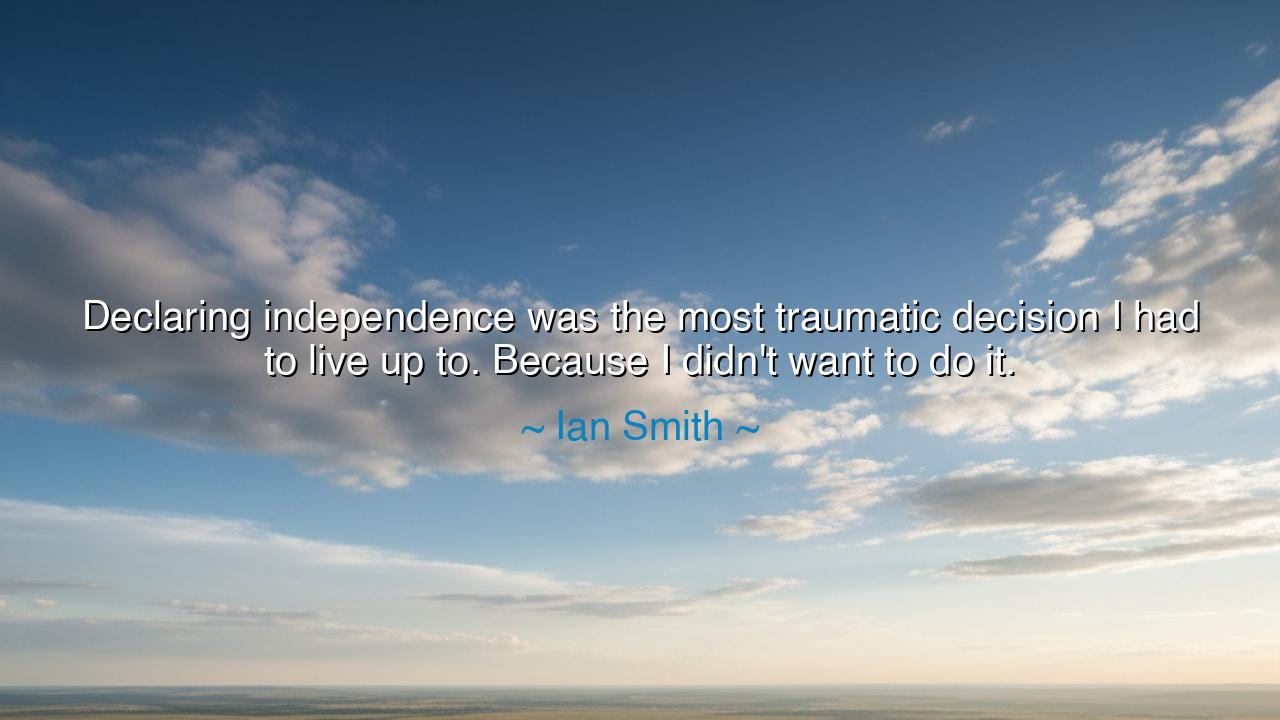
Declaring independence was the most traumatic decision I had to
Declaring independence was the most traumatic decision I had to live up to. Because I didn't want to do it.






The words of Ian Smith, spoken with the weight of history pressing upon his conscience, reveal a man torn between conviction and consequence. When he said, “Declaring independence was the most traumatic decision I had to live up to. Because I didn’t want to do it,” he was not boasting of rebellion or triumph, but confessing the anguish of a choice that would forever divide his country and stain his legacy. His words are a window into the torment of leadership—the moment when duty and desire, loyalty and fear, justice and pride, collide in the soul of one man. For every great decision in history, especially those that shape nations, carries within it both creation and destruction.
To understand the meaning of this quote, one must first return to the moment from which it was born. In 1965, Ian Smith, the Prime Minister of Rhodesia (now Zimbabwe), declared a Unilateral Declaration of Independence from Britain. It was a bold and controversial act, one that tore his land from the British Commonwealth and set it on a path of isolation, conflict, and eventual transformation. Smith, a white farmer turned politician, made this decision in defiance of Britain’s demand that Rhodesia transition to majority rule. In his mind, he was preserving stability and order; in the eyes of the world, he was preserving white minority power. His words, years later, reflect the torment of that moment—independence not as celebration, but as burden. He knew it would bring war, sanctions, and division, yet he believed himself cornered by history, forced to choose between surrender and survival.
His declaration of independence was not the joyous birth of a nation, as in America’s revolution, but the agonizing fracture of one. Smith called it “traumatic,” and indeed, it was. His decision, born from fear of losing control, led to years of bloodshed—the Bush War, a brutal conflict between the Rhodesian government and African nationalist movements. His government fell, and the land he sought to preserve was reborn as Zimbabwe under black majority rule. And yet, behind the politics, behind the condemnation and the defense, stands a universal truth that transcends his time and place: that leadership often demands choices no one wishes to make.
In the tone of the ancients, we might say that Smith’s words are the lament of a ruler standing before the altar of fate. There are moments in history when one’s will is both powerful and powerless—when to act is perilous, and to abstain is ruin. The act of declaring independence, in any age, is both a statement of pride and a plunge into uncertainty. Smith’s torment was not unique. From the kings of old who led their people into rebellion, to the revolutionaries who overthrew their masters, every leader who severs the bonds of allegiance must live with the echoes of his decision. Independence, though glorious in theory, is always born in pain.
Consider the example of George Washington, who too faced the terror of rebellion when America rose against the British crown. Unlike Smith, Washington’s cause was rooted in the fight for liberty, yet even he was haunted by the weight of his choice. In 1776, when the Declaration of Independence was signed, its authors knew they had crossed a line from which there was no return. They risked death, ruin, and the destruction of all they held dear. For them, as for Smith, independence was not an act of desire—it was an act of necessity. Washington wrote that he felt the “hand of Providence” guiding him, but beneath his courage lay the same torment Smith would later describe: the knowledge that freedom always exacts a price.
And so, Smith’s confession, stripped of politics, becomes a lesson on the nature of decision itself. The trauma of his choice is not confined to the realm of nations; it echoes in every life where one must act against one’s own peace for the sake of principle or survival. There are times when the road we must walk is not the road we wish to take. The burden of leadership—be it of a nation, a family, or a conscience—is to bear that weight without faltering. To choose not for comfort, but for conviction, even when the outcome is uncertain and the soul is weary.
The lesson of Ian Smith’s words, then, is not one of politics, but of humanity: that every act of independence carries both liberation and loss. To declare oneself free—whether as a person or a people—is to accept responsibility for what follows. True independence, if it is to endure, must be born not from fear or pride, but from justice, humility, and moral clarity. Smith’s tragedy lay not in his courage, but in the cause for which it was spent. His pain reminds us that decisions made in isolation, without regard for the freedom of all, become shackles rather than wings.
And so, the practical path is this: when faced with a choice that defines your life or the lives of others, pause and listen deeply—to conscience, to wisdom, to compassion. Seek independence, yes, but never the kind that excludes or oppresses. For every declaration, every act of defiance, every leap toward autonomy must be guided by the understanding that freedom gained at another’s expense is only a shadow of freedom. As Ian Smith confessed, independence without peace is trauma, and decisions made in fear become chains. Let us learn from his sorrow: that the truest independence is not rebellion alone, but the harmony of justice, courage, and the dignity of all.






AAdministratorAdministrator
Welcome, honored guests. Please leave a comment, we will respond soon